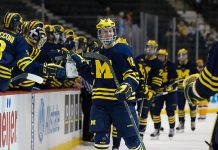I got a LinkedIn notification earlier this week that this month marks five years since I started writing the Hobey Watch Blog for USCHO. Of course, I’ve been part of the Hobey Watch a bit longer than that, starting in 2005 at CSTV, but it still gets me thinking.
Over the past eight years, I’ve gotten to know quite a bit about the Hobey Baker Award through writing about it, and the more I think about it, the more sure I am that the character criteria of the award is both my favorite and least favorite aspect of the award.
Yes, I said “criteria,” the plural, because while we tend to think of the first criterion (“Candidates must exhibit strength of character both on and off the ice”) when we talk about character, you can also read it into the second: Candidates must contribute to the integrity of the team and display outstanding skills in all phases of the game.)
In one sense, I love that these traits are considered as part of the Hobey Baker voting. In a world where phrases like “he only lied about sex,” “it was rape, but it wasn’t rape rape” and “the cream and the clear” are part of our vernacular, I think the world NEEDS more reminders to pay attention to character and integrity. The fact that it’s a major component of a prestigious athletic award like the Hobey Baker is a wonderful thing for the sport (as is, by the way, the fact that the Hockey Humanitarian Award winner is recognized at the same ceremony).
However, as someone who writes analysis of the Hobey voting once a week, it can really get to be a pain in the rear because it puts me in a position of trying to evaluate the character of kids I don’t really know based on news articles, which invariably leads to howls of outrage from fans who think I was either too harsh or too lenient.
It’s a good reason to consider the suggestion of Bob Norton, who once engaged me in a lengthy Hobey debate on an episode of “Hockey on Campus” in 2007 after T.J. Hensick had been left out of the Hobey Hat Trick for that year. Bob suggested that a real character assassination had taken place on Hensick, and that in the future, character considerations should be used only to bolster one player’s Hobey candidacy rather than tear down another one.
Now, I wasn’t part of the conference call before that year’s Hobey voting — in fact, I’ve never been asked to be on the committee — so I can’t tell you what was or wasn’t said about Hensick. I’m pretty sure I haven’t met Hensick more than once, and for all I know, he may be a great guy of strong character. However, I’ve been pretty consistent about the incident that some feel cost Hensick the 2007 award.
Getting thrown in the penalty box for arguing with a referee doesn’t make you a bad person and it certainly doesn’t make you seriously deficient in character. It makes you a hothead (and when was the last time yelling got a referee to change a call, anyway?). However, given that Hensick’s hotheadedness in that moment deprived Michigan of his services at a critical juncture in an NCAA tournament game, I have very little sympathy for him in the Hobey department.
But I digress. Sort of.
It certainly would have been much simpler two years ago if we could have just compared Matt Frattin and Andy Miele based on their on-ice accomplishments rather than get into a detailed analysis of Frattin’s fall and resurgence at North Dakota and whether his character was more or less Hobey-worthy than Miele’s. (I still would have picked Miele, by the way, but that’s my opinion.) There would have been much less anger, to be sure. That having been said, I stand by my original comment: It’s a credit to college hockey that we do include character among the stated criteria for our most prestigious individual award.
Which leads me back to Corban Knight. Knight, as we discussed last week, is North Dakota’s designated candidate for the Hobey and the leader in the online fan voting by a wide margin (the better part of 9,000 votes, at last count). He’s also one of five North Dakota players charged with “unlawful delivery to certain persons,” stemming from a preseason team party that also got him suspended for the first game of the season (along with three of his teammates).
Last week, I suggested that North Dakota fans shouldn’t worry about the party as it relates to Knight’s Hobey candidacy (I also pointed out that he has a lot of work to do to catch up to Boston College forward Johnny Gaudreau, who remains the front-runner for the award). This led to several questions about hypocrisy or lack of consistency on my part. And it’s tricky, I’ll admit. So I’m going to state my opinions on this character issue one more time, and then leave it (and Knight) alone until the top 10 finalists are announced, at which point we’ll see if it’s relevant to the Hobey race.
Let’s start with a question: What if, instead of the team party incident, Knight had gotten a speeding ticket? Would that make him unworthy of the Hobey? Of course not. I may think we need to be more mindful of character and integrity in this world but I don’t want to get into every single thing that someone has done that was against the law. Lots of people get speeding tickets and that doesn’t make them deficient in character.
When we were discussing Nathan Gerbe and his pattern of “inappropriate behavior” that got him suspended for a game by Hockey East in 2007, it involved a spearing penalty against Merrimack and allowing his ultra-competitive nature to push him to take things too far on the ice. That carried over into behavior that is not standard for college hockey players, hence the suspension, and hence it being the cause of some outrage in corners of the college hockey universe when Gerbe made a run at the Hobey that spring.
When we discussed Frattin two years ago, his charges included driving under the influence (for which he was acquitted) and throwing a lawnmower out into the street. Again, hardly standard behavior for college hockey players and, again, something that we discussed when he was a candidate for an award that considers character.
News flash: College kids drink.
College kids who play varsity sports drink. College kids who don’t play varsity sports drink. College kids drink when they’re over 21, and college kids drink when they’re under 21. Certainly, not all college kids drink but I think we can all agree that more do than don’t. And then, college kids grow up to be lawyers, doctors, teachers, business executives … and media members and college hockey coaches who vote on the Hobey Baker Award.
Is it right? Insofar as it’s against the law, certainly not. But then, so is speeding and we’re not going to deny anyone the Hobey over a speeding ticket.
Is providing beer to your underage teammates at a party more serious than a speeding ticket? Yes. Is it as serious (and as far from the norm) as driving drunk or throwing a lawnmower in the street? Of course not. Is it as far from the norm as dirty play that gets your conference commissioner to comment on it publicly when suspending you? I don’t think so.
Now, there is also the matter of the charges that Knight and his teammates face, and I think that makes things seem more serious. I can’t help but wonder what might have happened if Phil Kessel had been the player he was expected to be at the college level. Would those local news shots of Kessel drinking underage at the Blarney Pub and Grill have been used to deny him the Hobey? Somehow, I doubt it but the involvement of the police and the courts in the Knight situation does give me a bit of pause.
At the end of the day, my feeling is that when Knight’s character is up for discussion, the voters won’t consider the matter all that seriously and will let what happens on the ice decide the award.
And by that standard, Knight is still on the outside looking in.
We’ll see if that changes.


